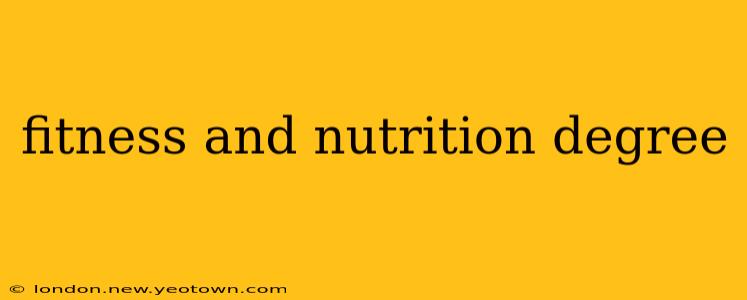The aroma of freshly brewed coffee filled the air as Sarah scrolled through her laptop, a determined glint in her eye. For years, she'd felt a pull towards helping others achieve their health goals, a passion ignited by her own transformative fitness journey. This led her to a life-altering decision: pursuing a degree in fitness and nutrition. This isn't just about bench presses and broccoli; it's about understanding the intricate dance between the body and its fuel, and empowering others to live healthier, happier lives. But what exactly does a fitness and nutrition degree entail, and is it the right path for you? Let's delve into the details.
What Does a Fitness and Nutrition Degree Cover?
A fitness and nutrition degree isn't a one-size-fits-all program. Curricula vary depending on the institution, but common threads weave through most programs. Expect a blend of theoretical knowledge and practical application, preparing you for a dynamic career in the health and wellness industry. You’ll likely explore:
-
Exercise Physiology: Understanding how the body responds to exercise, including adaptations to training, energy systems, and the physiological benefits of different activities. Think beyond just the "burn"—it's about the cellular level changes that contribute to long-term health.
-
Nutrition Science: This delves into macronutrients (carbohydrates, proteins, fats), micronutrients (vitamins, minerals), and their roles in overall health and athletic performance. You’ll learn about dietary guidelines, meal planning, and the science behind nutritional deficiencies and excesses.
-
Kinesiology: The study of human movement, encompassing biomechanics (how the body moves), motor control (how the nervous system regulates movement), and musculoskeletal anatomy. This provides a crucial foundation for designing safe and effective exercise programs.
-
Program Design: This practical component teaches you how to assess clients, set goals, and create personalized exercise and nutrition plans tailored to individual needs and fitness levels. It's about moving beyond generic workout routines and creating truly transformative experiences.
-
Health and Wellness Coaching: Developing essential communication and coaching skills is vital. You'll learn strategies for motivating clients, overcoming barriers, and fostering sustainable lifestyle changes. It's about building trust and becoming a supportive guide on their health journey.
What Types of Fitness and Nutrition Degrees Are Available?
The options extend beyond a simple bachelor's degree. You might consider:
-
Bachelor of Science (BSc) in Exercise Science or Kinesiology: These often serve as a strong foundation, providing a broad understanding of human movement and physiology. Nutrition is usually a significant component, preparing you for further specialization.
-
Bachelor of Science (BSc) in Nutrition: Focusing more on the nutritional side, these degrees equip you with a deep understanding of diet, metabolism, and the impact of food on health. Fitness might be included, but often as a complementary subject.
-
Associate Degrees: Shorter programs offering a quicker entry into the field, particularly useful if you already have some experience and want to specialize. However, career advancement often requires further education.
-
Certifications: While not degrees, certifications in areas like personal training, group fitness instruction, or sports nutrition can significantly boost your career prospects, often complementing your degree.
What are the Career Paths After Earning a Fitness and Nutrition Degree?
Sarah's vision wasn't just about a degree; it was about making a difference. With a fitness and nutrition degree, the possibilities are vast:
-
Personal Trainer: Designing and implementing personalized fitness programs for individuals.
-
Group Fitness Instructor: Leading classes like Zumba, yoga, or spin.
-
Registered Dietitian (RD) or Registered Dietitian Nutritionist (RDN): Requires further licensing and education, focusing on medical nutrition therapy.
-
Wellness Coach: Guiding individuals through lifestyle changes focusing on holistic well-being.
-
Corporate Wellness Specialist: Designing and implementing health and wellness programs within organizations.
-
Fitness Director or Manager: Overseeing fitness facilities and staff.
-
Research: Contributing to the ever-evolving field of exercise science and nutrition through research.
How Long Does It Take to Get a Fitness and Nutrition Degree?
The duration depends on the program you choose. A bachelor's degree usually takes four years of full-time study, while associate degrees typically take two years.
Is a Fitness and Nutrition Degree Worth It?
For Sarah, the answer was a resounding yes. The journey wasn't easy, but the rewards—both personal and professional—have been immense. If you're passionate about health and wellness, have a strong work ethic, and enjoy helping others achieve their goals, a fitness and nutrition degree can be an incredibly rewarding path. It’s an investment in yourself and in the potential to positively impact countless lives. The feeling of empowering others to achieve their health goals is a reward unlike any other.
What are the job prospects for graduates with a fitness and nutrition degree?
Job prospects are promising, especially for graduates who specialize in niche areas and gain relevant certifications. The demand for qualified fitness and nutrition professionals continues to grow as the focus on health and wellness increases. However, competition exists, so specialization and continuing education are key to career success.
What is the average salary for someone with a fitness and nutrition degree?
Salaries vary significantly depending on factors such as experience, specialization, location, and the type of position. While entry-level positions might offer a modest salary, experienced professionals in specialized roles can earn a comfortable living.
How can I find the right fitness and nutrition degree program for me?
Research programs carefully, considering factors like curriculum, accreditation, faculty expertise, and career services. Visit university websites, attend open houses, and speak with current students and alumni to get a comprehensive picture. Choose a program that aligns with your career aspirations and learning style.
This journey, much like fitness itself, requires dedication and perseverance. But with the right preparation and passion, a fitness and nutrition degree can open doors to a fulfilling and impactful career, helping you—and others—live healthier, stronger, and more vibrant lives.

